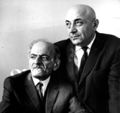Difference between revisions of "Mahari Gurgen"
From Hayazg.info
Aghazanchyan (talk | contribs) |
Aghazanchyan (talk | contribs) |
||
| Line 22: | Line 22: | ||
==Work Activity== | ==Work Activity== | ||
| − | * | + | *Started his creative life with the poems "Titanic" (1926), "The Poplars" (1927) and the digest "Mrgahas", which particularly brought him lierary recognition, including ballads and poems. |
*Had begun to prose since the late 1920s, as a result of which published his digests "About Love, Jealousy and the Partisans of Nizza" (1929) and " In Zigzags"- a collection of short stories (1931). | *Had begun to prose since the late 1920s, as a result of which published his digests "About Love, Jealousy and the Partisans of Nizza" (1929) and " In Zigzags"- a collection of short stories (1931). | ||
*The trilogy "The Childhood" (1928), "The Adolescence" (1929-1930) and "The Youth Shadow" (written during his second exile in 1952-1955) presents the experiences of Mahari's personal life. | *The trilogy "The Childhood" (1928), "The Adolescence" (1929-1930) and "The Youth Shadow" (written during his second exile in 1952-1955) presents the experiences of Mahari's personal life. | ||
| Line 43: | Line 43: | ||
*On July 16, 1969 died in Palanaga, leaving the novels "The Youth" and "Brave Nazar" half-written and was buried in Yerevan. | *On July 16, 1969 died in Palanaga, leaving the novels "The Youth" and "Brave Nazar" half-written and was buried in Yerevan. | ||
*One of the streets of Yerevan's Erebuni administrative district and School №176 in Yerevan bear Gurgen Mahari's name. | *One of the streets of Yerevan's Erebuni administrative district and School №176 in Yerevan bear Gurgen Mahari's name. | ||
| + | '''Quotations About Mahari Gurgen''' | ||
| + | *The future of our country is bright, oh the fertile fields' minstrel. May this flower live forever, grown in our fields. [[Charents Yeghishe]] | ||
| + | *Finally, another poet, except whom no one else describes the poplars, the moon, the singing water so belovedly. [[Bakunts Axel]] | ||
| + | *Mahari wrote with the flexibility of our state language, but in essence, he had inheritance of the Western Armenian language, which shades were included in the works of Isahakyan and Vahram Papazyan. There is a flawless accuracy of the fur shades. He's a writer, I believe, who will live as long as the front of the Mesrobus scriptures collapse, as long as the souls searching for the beauties of the Armenian spirit are found. [[Teryan Vahan]] | ||
| + | *Despite the adventures, there is something stubborn in the life and temper of Gurgen Mahari. No matter how many times the waves on the surface come and go, there- in the depth, Mahari remained loyal to him, to his stressed personality, to his poetic rudiment. [[Kaputikyan Silva]] | ||
| + | *Mahari remained the same optimistic person from the beginning to the end. His lips never got accustomed to curse. He immediately went into the whirlpool of life and wrote the novel of his own life. I deeply feel his absence and bow to his memory. [[Hovhannisyan Hrachya]] | ||
=Images= | =Images= | ||
<gallery> | <gallery> | ||
| − | Image: | + | Image: Mahari.jpg|Mahari with his wife and son |
| + | Image: Ph138668799615.JPG|Gurgen Mahari and Hamo Sahyan | ||
</gallery> | </gallery> | ||
=Videos= | =Videos= | ||
| − | *[ | + | *[https://m.youtube.com Գուրգեն Մահարի:] |
| − | + | *[https://m.youtube.com Գուրգեն Մահարու հետ:] | |
| − | + | *[https://m.youtube.com Poezia-Պոեզիա Գուրգեն Մահարի:] | |
| − | *[ | + | *[https://m.youtube.com Հայտնի ու անհայտ Գուրգեն Մահարին:] |
| + | *[https://m.youtube.com Լևոն Հախվերդյան - Գուրգեն Մահարու ստեղծագործությունն ու աշխարհայացքը:] | ||
=Bibliography= | =Bibliography= | ||
| − | * | + | '''Digests''' |
| − | * | + | *Մահարի Գ., Արտամետյան գիշերներ, 1922: |
| + | *Մահարի Գ., Ծովի երգեր: | ||
| + | *Մահարի Գ., Սիրո, խանդի ու Նիցցայի պարտիզանների մասին, 1929: | ||
| + | *Մահարի Գ., Զիգզագներում, 1931: | ||
| + | *Մահարի Գ., Մրգահաս, 1937: | ||
| + | *Մահարի Գ., Անդունդն ի վեր: | ||
| + | *Մահարի Գ., Անանձնական: | ||
| + | *Մահարի Գ., Հնձաններ, 1959: | ||
| + | *Մահարի Գ., Լռության ձայնը, 1962: | ||
| + | '''Books''' | ||
| + | *Մահարի Գ., Տիտանիկ,1924: | ||
| + | *Մահարի Գ., Երկու պոեմ, 1926: | ||
| + | *Մահարի Գ., Բարդիներ, 1927: | ||
| + | *Մահարի Գ., Չարենց-նամե, 1968: | ||
| + | *Մահարի Գ., Այս հմուտ, հանճարեղ լոռեցին: | ||
| + | '''Novels''' | ||
| + | *Մահարի Գ.,Մանկություն: | ||
| + | *Մահարի Գ., Պատանեկություն, 1929-1930: | ||
| + | *Մահարի Գ., Այրվող այգեստաններ, 1966: | ||
| + | *Մահարի Գ., Ծաղկած փշալարեր: | ||
=See also= | =See also= | ||
| − | * Ով ով է.հայեր(կենսագրական հանրագիտարան:Երկու հատորով),ՀՀ խմբ. հանձնաժողով՝ Հ. Մ. Այվազյան (գլխ. խմբագիր) և ուրիշներ,Երևան,Հայկական հանրագիտարան հրատ.,Հ. | + | *Ով ով է.հայեր (կենսագրական հանրագիտարան: Երկու հատորով), ՀՀ խմբ. հանձնաժողով՝ Հ. Մ. Այվազյան (գլխ. խմբագիր) և ուրիշներ, Երևան, Հայկական հանրագիտարան հրատ., Հ.2, Ճաղարյան-Ֆրիկ, 2007: |
| + | *[http://www.armenianlanguage.am Աղաջանյան Ս.,Գուրգեն Մահարու արձակի պոետիկան, Երևան, ԵՊՀ հրատ., 2011:] | ||
| + | *Աղաբաբյան Ս., Գուրգեն Մահարի, Երևան, 1959: | ||
| + | *Ադաբեկյան Կ., Գուրգեն Մահարի, Երևան, ԵՊՀ հրատ., 1975: | ||
| + | *Բոդոսյան Ս., Գուրգեն Մահարի, Երևան, 1981: | ||
| + | *Գասպարյան Դ., Գուրգեն Մահարի, Երևան, 2013: | ||
| + | *[http://granish.org ԳՈՒՐԳԵՆ ՄԱՀԱՐԻ|Բանաստեղծություններ:] | ||
| + | *[http://www.armenianlanguage.am Մահարի Գ.,Սիբիրական, Երևան, ԵՊՀ հրատ., 2009:] | ||
| + | *Մահարի Ա., Իմ ոդիսականը, Անթիլիաս, 1994: | ||
| + | *Վիրաբյան Ն., Հայ դասական գրողներ։ Գուրգեն Մահարի, Երևան, 2012: | ||
| + | *[http://www.golosarmenii.am ПОСЛЕДНИЙ ПУТЬ:] | ||
| + | *[http://www.acam-france.org Gourguen MAHARI (1903 - 1969):] | ||
| + | *[http://www.armenianhouse.org ГУРГЕН МААРИ (1903-1969):] | ||
| − | [[Category: | + | [[Category:poets]] [[Category:writers]] [[Category:specialists in literature]] [[Category:fiction writers]] |
Revision as of 17:44, 30 July 2017
Contents
Biography
Was born on August 1, 1903 in Van, the Western Armenia (now Turkey).
Education
- Studied at the "Norashen" and "Yeramyan" colleges, later at the YSU at the historical-linguistic faculty.
Work Activity
- Started his creative life with the poems "Titanic" (1926), "The Poplars" (1927) and the digest "Mrgahas", which particularly brought him lierary recognition, including ballads and poems.
- Had begun to prose since the late 1920s, as a result of which published his digests "About Love, Jealousy and the Partisans of Nizza" (1929) and " In Zigzags"- a collection of short stories (1931).
- The trilogy "The Childhood" (1928), "The Adolescence" (1929-1930) and "The Youth Shadow" (written during his second exile in 1952-1955) presents the experiences of Mahari's personal life.
- In 1950s Mahari's creative life gained a new impetus when the digests "The Hearths" (1959), "The Voice of Silence" (1962), and the novel "The Burning Orchards" (1966) were published.
Achievements
- In 1934 became a member of the Writers' Union of the USSR.
- In 1965 became an honoured figure in culture of the Armenian SSR.
- Was awarded the State Prize posthumously for the novel "The Bloomed Barbed Wires".
Other
- When he was only 8, his uncle shot his father allegedly accidently.
- In 1915 while migrating to the Eastern Armenia his uncle left his mother, sister and her family, died Gurgen's grandmother, later he lost his relatives and along with other refugees went to the Eastern Armenia.
- In 1915 sheltered in the orphanages of Dilijan and Yerevan, where he got acquainted with Charents Yeghishe.
- In 1917 began Mahari's creative biography when his first poem was published in the magazine "Work" ("Աշխատանք") under the name "G. Arpuni".
- In 1918 published poems in the magazines "Work", "Van-Tosp" and many others.
- In 1936 was arrested, and on August 20, 1947 was exempted from exile, returned to Yerevan, where his wife had already abandoned him, and his mother died.
- In November, 1949 was once again exiled to Siberia as an immoral element, but this time as a free exile, not as a detainee, and in summer of 1954 was exempted and returned to Yerevan.
- During the second exile, got acquainted with his second wife, a Lithuanian woman Antonina Povilaityte, got married in 1952 and had two children, a boy and a girl.
- On July 16, 1969 died in Palanaga, leaving the novels "The Youth" and "Brave Nazar" half-written and was buried in Yerevan.
- One of the streets of Yerevan's Erebuni administrative district and School №176 in Yerevan bear Gurgen Mahari's name.
Quotations About Mahari Gurgen
- The future of our country is bright, oh the fertile fields' minstrel. May this flower live forever, grown in our fields. Charents Yeghishe
- Finally, another poet, except whom no one else describes the poplars, the moon, the singing water so belovedly. Bakunts Axel
- Mahari wrote with the flexibility of our state language, but in essence, he had inheritance of the Western Armenian language, which shades were included in the works of Isahakyan and Vahram Papazyan. There is a flawless accuracy of the fur shades. He's a writer, I believe, who will live as long as the front of the Mesrobus scriptures collapse, as long as the souls searching for the beauties of the Armenian spirit are found. Teryan Vahan
- Despite the adventures, there is something stubborn in the life and temper of Gurgen Mahari. No matter how many times the waves on the surface come and go, there- in the depth, Mahari remained loyal to him, to his stressed personality, to his poetic rudiment. Kaputikyan Silva
- Mahari remained the same optimistic person from the beginning to the end. His lips never got accustomed to curse. He immediately went into the whirlpool of life and wrote the novel of his own life. I deeply feel his absence and bow to his memory. Hovhannisyan Hrachya
Images
Videos
- Գուրգեն Մահարի:
- Գուրգեն Մահարու հետ:
- Poezia-Պոեզիա Գուրգեն Մահարի:
- Հայտնի ու անհայտ Գուրգեն Մահարին:
- Լևոն Հախվերդյան - Գուրգեն Մահարու ստեղծագործությունն ու աշխարհայացքը:
Bibliography
Digests
- Մահարի Գ., Արտամետյան գիշերներ, 1922:
- Մահարի Գ., Ծովի երգեր:
- Մահարի Գ., Սիրո, խանդի ու Նիցցայի պարտիզանների մասին, 1929:
- Մահարի Գ., Զիգզագներում, 1931:
- Մահարի Գ., Մրգահաս, 1937:
- Մահարի Գ., Անդունդն ի վեր:
- Մահարի Գ., Անանձնական:
- Մահարի Գ., Հնձաններ, 1959:
- Մահարի Գ., Լռության ձայնը, 1962:
Books
- Մահարի Գ., Տիտանիկ,1924:
- Մահարի Գ., Երկու պոեմ, 1926:
- Մահարի Գ., Բարդիներ, 1927:
- Մահարի Գ., Չարենց-նամե, 1968:
- Մահարի Գ., Այս հմուտ, հանճարեղ լոռեցին:
Novels
- Մահարի Գ.,Մանկություն:
- Մահարի Գ., Պատանեկություն, 1929-1930:
- Մահարի Գ., Այրվող այգեստաններ, 1966:
- Մահարի Գ., Ծաղկած փշալարեր:
See also
- Ով ով է.հայեր (կենսագրական հանրագիտարան: Երկու հատորով), ՀՀ խմբ. հանձնաժողով՝ Հ. Մ. Այվազյան (գլխ. խմբագիր) և ուրիշներ, Երևան, Հայկական հանրագիտարան հրատ., Հ.2, Ճաղարյան-Ֆրիկ, 2007:
- Աղաջանյան Ս.,Գուրգեն Մահարու արձակի պոետիկան, Երևան, ԵՊՀ հրատ., 2011:
- Աղաբաբյան Ս., Գուրգեն Մահարի, Երևան, 1959:
- Ադաբեկյան Կ., Գուրգեն Մահարի, Երևան, ԵՊՀ հրատ., 1975:
- Բոդոսյան Ս., Գուրգեն Մահարի, Երևան, 1981:
- Գասպարյան Դ., Գուրգեն Մահարի, Երևան, 2013:
- ԳՈՒՐԳԵՆ ՄԱՀԱՐԻ|Բանաստեղծություններ:
- Մահարի Գ.,Սիբիրական, Երևան, ԵՊՀ հրատ., 2009:
- Մահարի Ա., Իմ ոդիսականը, Անթիլիաս, 1994:
- Վիրաբյան Ն., Հայ դասական գրողներ։ Գուրգեն Մահարի, Երևան, 2012:
- ПОСЛЕДНИЙ ПУТЬ:
- Gourguen MAHARI (1903 - 1969):
- ГУРГЕН МААРИ (1903-1969):


